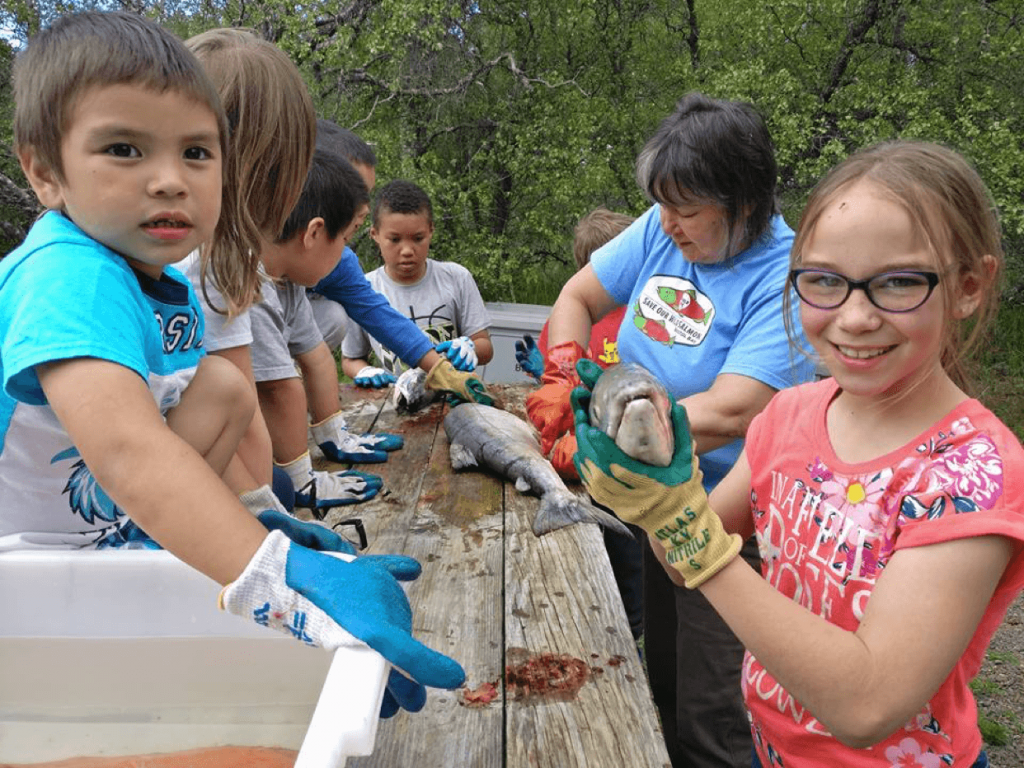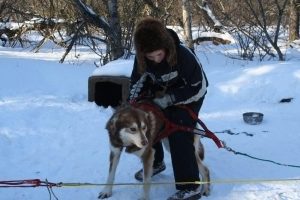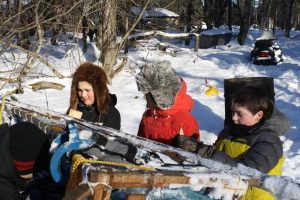The Bristol Bay FRTEP program serves an area the size of Ohio that includes 31 tribes and more than 7,500 people. The landscape and remoteness of the region prohibits construction of roads making air travel the most common form of transportation.
Activities
Located more than 300 miles west of Anchorage on the Bering Sea, Bristol Bay teems with wildlife, fish runs, and natural resources that support the subsistence lifestyle of its residents. The Bristol Bay Native Association is a consortium of 31 Tribes organized as a non-profit corporation to provide a variety of educational, social, economic and related services to the Native people of the region. The Bristol Bay FRTEP program is housed in the offices of the corporation.
Highlights

MEASURING IMPACT
-
“We’re having these amazing outcomes that we didn’t have before and it’s happening because FRTEP is here.”
-
“Yeah, I kind of feel like I’ve done it all. [Extension-sponsored] LEGO, ballet, STEM, 4-H. But I think that ballet was kind of the main one for me….. I’ve done it for five years now. It really had an impact…the different moves, the way that we could just express ourselves through dance, it was really amazing. …..in general the positive atmosphere of 4-H has really impacted a lot of kids.”
FRTEP programs have had a major impact on individuals, families and tribal communities. Just how much impact has now been quantified thanks to a research project that used Ripple Effects Mapping (REM) and content analysis. The Indian Land Tenure Foundation (ILTF) engaged in a joint collaboration with an evaluation team and the Western Extension Risk Management Education Center to measure the long-term impacts of the Federally Recognized Tribal Extension Program (FRTEP) serving the United Tribes of Bristol Bay. Click the link below to read the report.
The Bristol Bay FRTEP program supports 4-H and positive youth development activities and events in Dillingham and communities throughout the region, including Nondalton, Iliamina, Levelock, Aleknagik, Clark’s Point, Lou’s Point and Manokotak.  The 4-H club serves youth in Kindergarten through 12th grade and is project- or interest-driven. With an emphasis on traditional values and cultures, Bristol Bay 4-H encourages youth to develop a sense of independence and responsibility to self, others and the community that will help them visualize possibilities for their future.
The 4-H club serves youth in Kindergarten through 12th grade and is project- or interest-driven. With an emphasis on traditional values and cultures, Bristol Bay 4-H encourages youth to develop a sense of independence and responsibility to self, others and the community that will help them visualize possibilities for their future.
The goal is to engage youth in hands-on learning in culturally relevant activities in the areas of food security, and learning about the natural world and resources and their role in conserving and protecting those resources. Club activities include trapping, skin sewing, birding, ballet, LEGO, collage, gardening, as well as Culture Camps and clubs.
Supporting traditional values, food sources
The FRTEP program distributes materials and offers demonstrations that support families, individuals and communities in the Bristol Bay region. Activities are centered around Alaskan culture and values such as subsistence, living off the land, trapping, fishing and processing animals and salmon, as well as identifying local plants for food and medicinal use.
Tribal youth and community members gather to share stories and learn how to create traditional meals. The focus is on values such as honoring Elders, respecting the land and each other, and providing for others. Participants learn Native arts and crafts such as drum making, skin sewing, Native dance and story telling.
COVID-19 activities
Tribal extension has helped the community deal with the COVID-19 crisis in a variety of ways:
- 4,256 meals were provided to youth ages 0-18
- 3,000 pounds of produce was distributed to Elders in the community
- Social media prevention and outreach activities
- Virtual Egg hunt – Individuals hid plastic eggs and posted photos on social networks for youth to seek out.
- Virtual painted rock hide-and-seek – Community members hid painted rocks and post photos on social networks for youth and community members to seek out and re-hide or keep.
- Teddy Bear hunt – Individuals put toys in their windows or yards for kids to seek out while social distancing.
- Posted on social networks: Daily resiliency factors and information on reporting child abuse and neglect and bringing attention to Child Abuse Prevention Month in April.
- Provided 41 garden kits to youth and families.
- Sewed and distributed 350 personal protective face masks and 19 ear guards for first responders, elders, foster families and other community members.
- A face mask fashion show included 111 entries on social media.
- A face mask poster contest is underway to promote health and safety with 92 entries. Collage posters will be created and provided for local distribution.
- Planted six raised beds of fruit and vegetables to start a community garden.
- 77 youth received kits with supplies for cultural projects such as Yupik dance fans, story knives, salmon and bird studies, plants and gardens, STEM activities and more. Parents were very enthusiastic about the quality and quantity of the weekly kits.
- 50 STEM kits were provided to youth to continue STEM club at home.
- Although the Ballet Club recital was canceled, over 50 youth and families participated in the social media challenge to post their own choreographed dance.

Contact Information
Mara Bascujlaky – Program Director
Phone Number
907-452-8251 (ext. 3477)
mara.bacsujlaky@alaska.edu